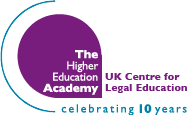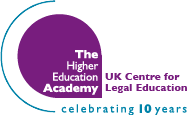Embracing benchmarks: some pedagogical and assessment implications of adopting benchmarks
David Grantham and Beverley Steventon, Coventry University
One of five reports from the workshop session dedicated to the process of implementing the law benchmark standards.
Coventry University law degrees and joint degrees were revalidated in May 1999 for a September 1999 start. There was a strong feeling amongst colleagues on the revalidation working group that before the next review in 2005 benchmarking standards would overtake us. We wanted to be well prepared for this development, so it was decided to incorporate benchmarks into the proposals for the revalidation.
Taking the draft benchmark standards as our particular set of benchmarks we discussed the merits of each of the abilities and competencies. Happily, we found that we had already implicitly incorporated a number of the general transferable and key skills into current programs. However, the embracing of benchmarks gave us the chance to make these skills (and some new ones like being able to use the Web) very explicit, to both the students and ourselves.
As suggested in the draft, the benchmarks for our programmes were set at threshold level (minimum level for an honours graduate). We then added a few ‘abilities’ of our own and produced a master list. Each benchmark was given a prefix that would be a uniform identification code across all modules. Colleagues were then asked to identify which abilities and competencies in each domain were likely to be developed in their modules. Descriptors of modules were then drafted to incorporate the benchmarks as learning ‘outcomes’. At the module approval stage it was suggested that we add a fourth domain, ‘module specific abilities’. These would identify those learning outcomes which tended to be unique to a particular module.
Before the course approval stage the university decided to make learning ‘objectives’ an essential feature of all module approvals. Our ‘outcomes’ had to become ‘objectives’, even though the former nomenclature more properly catches one of the essential purpose of benchmarks, ie to describe what, at the end of a programme of study, a student should be able to do (Bell, 1999).
Our module approval panel decided that we had far too many benchmarks in the modules and that we ought to reduce them. Certain objectives (for example, identify and retrieve legal information, use paper and electronic sources, use primary and secondary legal sources relevant to the topic under study) were really pervasive in both core and option modules and did not need to appear in module objectives. We mapped these ‘common’ objectives against the programme as a whole. Colleagues had then to revisit their module descriptors and prune out the common objectives.
A subsequent course approval panel insisted that we also map ‘progression’ by level of objective for each year of the programme. Given the nature of the discipline (even year one contract students have to attempt some evaluation of policy factors) this was no easy task. However, there was a general trend of progression form lower order to higher order skills and this was duly mapped.
Pedagogical issues
Embracing benchmarks has important implications for the way law modules, or programmes of study, are delivered. The main purpose of this paper is to briefly examine some of the learning, teaching and assessment issues that, arguably, are implicit in benchmarking. We discussed some of these matters before revalidation, but others are emerging as we grapple more fully with the reality of what we have done. The following are built on the assumption that changes in pedagogy are necessary if the benchmarking process is to be more than a mere paper exercise. It also assumes that, although the benchmarking debate is not over, all law degree courses will, in the medium term, have to apply them.
There will need to be more focus on the ‘process of learning’, rather than on the ‘content’ of what is learned. Skill acquisition, whether of the intellectual or personal kind, tends to depend heavily on the way in which learning experiences are designed. Competence (and better than mere competence) is much more likely to happen in a student-centred, as distinct from a teacher-directed, learning environment. We can all try to teach a skill to a student, but “nothing is taught until it is learned” (Frazer, 1992). As professionals, we will need to have a clear focus on what it is like to be the learner and ‘mould’ the learning experiences to this perception (Marton & Booth, 1997).
Students must practice the skill in an environment of encouragement, ie one that is both safe and supportive. At Coventry we are just beginning to exploit the power of an virtual learning environment that has numerous possibilities for providing such a student-centred environment (Grantham, 1999, 2000).
We need to clearly identify those benchmark areas where we currently do not provide the students with sufficient opportunities to practice and achieve the objective. An example from Coventry is the teamwork and other skills involved in presentations. The students give presentations in years 1 and 2, but only if they study the module on evidence do they practice the necessary skills in year 3.
As a group of learning and teaching professionals we have a duty to identify and apply best practice. Benchmarks provide a context for reflection upon this practice. The fact that the issue of benchmarking is controversial (see for example Bradney, 1999 and Elton, 1999) is likely to stimulate this reflective process, rather than hinder it.
Assessment issues
A curriculum should not simply reveal congruence between its aims, objectives and learning and teaching strategies. According to Stake (1967) the assessment elements of a curriculum should be similarly congruent. Student achievement of benchmarks, in the form of learning objectives at Coventry, has to be tested and somehow recorded. As with the benchmarks themselves, we found that a number of the abilities and competencies were already being assessed in our law degrees and joint degrees, implicitly, rather than explicitly. However, a number of unresolved issues remain:
Although there is already some evidence that courseworks are addressing learning objectives sometimes in a quite innovative way, how can we promote even more congruence without being prescriptive with colleagues? This danger, referred to by Bradney (1999), is ever present and we are attempting to address it in the spirit of support and development.
Is it generally true that students only consider ‘content’ as important and only then if it assessed? If this is generally the case then how do we persuade them to see skills as of equal importance through the assessment process?
How do we give feedback on skills? We have allowed those colleagues most affected by benchmarks, first year core module leaders, to experiment with different ways of recording achievement, but none of the methods are free from over-bureaucracy. We have, however used the ubiquitous tickbox or table and nomenclature from ‘not achieved’, ‘not yet achieved’, (which we prefer since it is a kind of positive feedback or, at least, hopeful feedback!), to ‘achieved’ and ‘well achieved’. The real difficulty lies with the number of students being assessed. We may have to settle for just two skills statements (‘achieved’ or ‘not yet achieved’), simply because of avoiding the trawl of 200+ scripts for evidence of performance that exceeds mere competence.
‘Not yet achieved’ learning objectives will have to be achieved. This raises the issue of support for ‘not yet achieving students’. Although we have a personal tutor system at Coventry, it could easily be overwhelmed by needy students wanting help to ‘achieve’. To assist in this crucial aspect of the learning process we have links to online help in our virtual learning environment. These include assistance with essay writing, note taking and giving presentations.
We have not yet reached a conclusion on how we are to produce a personal record of achievement for each student, or, indeed, whether it should be the responsibility of the student. The latter has a number of attractions, including encouraging a responsible attitude in the student. However, there would need to be some form of verification and we have not yet worked out the necessary logistics.
Conclusion
Benchmarks can be perceived as threats or as opportunities. As a group of academic lawyers and learning and teaching professionals we decided that they were opportunities – to provide the student with a better learning experience. Whilst it is true that they do engender some bureaucracy, it is also true that they provide an important platform for curriculum and professional development. If we are to be numbered with Hoyle’s ‘extended professionals’ (1980) or Schon’s (1987) ‘reflective practitioners’ then we needed to consider the implications of benchmarking and how we could best use them to the advantage of the student.
We have not abandoned the philosophy of the liberal law degree. Indeed, we would argue that this and benchmarking are not at all mutually incompatible. One of the central learning objectives of our law and joint law degrees is:
“ To make personal and informed judgments about the importance and merits of particular solutions or policy issues and to offer reasoned arguments in favour of a chosen point of view.”
(Bold text was an addition to the originally proposed benchmark). This we would argue is in the best traditions of the liberal law degree, and it features prominently in most modules. We still have some way to go in our developmental processes, but we are learning or honing many skills along the way.
Reference
- Ballantyne R, Bain J and Packer J (1997) Reflecting on university teaching: academic stories Canberra: Department of Employment, Education, Training and Youth Affairs
- Bell J (1999) Benchmarking: a pedagogically valuable process? Web Journal of Current Legal Issues
- Bradney A (1999) Benchmarking: a pedagogically valuable process? An alternative view Web Journal of Current Legal Issues
- Elton L (1999) Keynote speech to the Inaugrual Learning in Law Initiative (LILI) conference, 8 January, 1999
- Frazer M (1992) ‘Promoting learning’ in R Barnett (ed) Learning to effect Oxford: OUP
- Grantham D (1999) IOLISplus: extending the electronic learning environment Journal of Information Law and Technology
- Grantham D and Hunt N (1999) ‘Web interfaces to enhance CAL materials: case studies from Law and Statistics’ ALT-J (Journal of the Association for Learning Technology) vol 7 no 3
- Hoyle E (1980) ‘Professionalisation and deprofessionalisation in education’ in E Hoyle and J Megarry (eds) World Yearbook of Education: Professional development of teachers London: Kogan Page
- Marton F and Booth S (1997) Learning and awareness Mahwah, New Jersey: Lawrence Erlbaum
- Schon D (1987) The reflective practitioner San Francisco: Jossey Bass
- Stake R (1967) ‘The countenance of educational evaluation’ Teachers College Record 68 pp523-540
Last Modified: 12 July 2010



Comments
There are no comments at this time